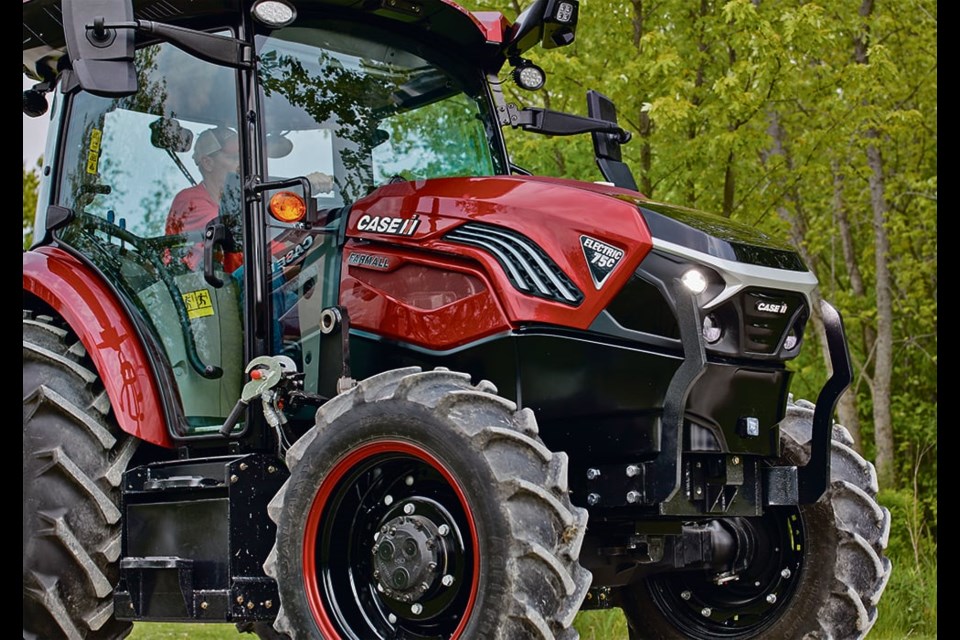WESTERN PRODUCER — A few agricultural equipment manufacturers have recently shown battery electric-powered implements as concepts or prototypes, but the CNH brands New Holland and Case IH are the first majors to unveil production-ready tractors: the New Holland T4 Electric and Case IH Farmall 75C Electric.
Jeff Akel, global product manager for Case IH, said the company expects to be ready to accept customer orders for the Farmall 75C Electric by the end of the year and begin delivering them in the spring of 2024.
“It’s been a fun journey,” he said of the research and development effort that led up to the tractors’ launch.
“We had all our engineering centres around the world collaborating on this for the last three years. It’s been unusual to have a mix of the different specialties around the world to introduce the Farmall 75C Electric.”
The lithium-ion battery pack will provide an average run time of four hours, depending on the type of work being done.
“We’re claiming an average run time of four hours,” he said.
“But in reality it depends on how you use this tractor. For example, for loader or transport work you can run up to six or eight hours, but for heavy tillage it’s probably going to go three hours or less. It really depends on use.
“We have several charging options. With a normal AC level one charger, it can take up to 11 hours. There’s an AC level two and a DC fast charge. DC fast charge will charge the tractor in less than an hour.”
As a result, owners can chose the charger that best suits their needs.
The Farmall 75C Electric uses an industry standard J1771 charger connection. However, the company will follow the automotive sector’s lead and continue to use the type of connection that eventually becomes standard there. As well, chargers will be available directly from Case IH.
“We’ll be selling chargers through our parts department,” he said.
The Farmall 75C Electric will also offer three advanced autonomy modes, and more are in development that will eventually be added to the initial technology suite.
“Initially at launch, we’re considering three automation and driver assist modes: follow-me mode, invisible bucket and safety,” said Akel.
“Later on we’ll have another introduction called row follow, which is a guidance system. But instead of GPS signals, it’s more based on using ground markers. It’s a step to early autonomy.”
The follow-me mode allows the operator to use hand signals to let the tractor know to follow behind. It then continues to follow and take direction from that person, even when others are present.
“It recognizes gestures,” he said.
“You signal it to stop or just stand in its way. It won’t run over people, animals or objects. You just walk along and it follows you.
“Safety mode signals to the tractor someone is coming within a certain boundary. If that person continues to approach, it’ll stop. With more AI (artificial intelligence), you’ll start to train the tractor on what to stop for and what not to stop for. Initially, it’s trained to stop for everything. I’m sure with later versions of software, we’ll make the tractor smarter on where to stop.
“It will have the intelligence to learn. That’s how it was built.”
The mounted camera allows an operator to see “through” the loader bucket, improving forward visibility on loader-equipped models.
For ease of operation, the tractor is designed to be operated the same as diesel models. However, owners are likely to find the electric drive nicer to run.
“It’s a lot easier to drive,” Akel said.
“There are a lot of benefits to electrification besides zero emissions, which I think farmers will come to realize at some point. Many already do.”
As for the cost of operation, that will depend on the cost of grid electricity, which varies significantly across provinces. However, maintenance costs are expected to be lower, and no fuel is wasted during idling.
“We know from research studies, with a diesel tractor you’re typically idling 15 to 20 percent of the time in operations,” Akel said. “But with an electric tractor, you don’t have to do that anymore. For service and maintenance, you’re not going to spend as much.”
Akel said interest in the 75C Electric has come from more industry sectors than expected, and he thinks demand for battery-electric and alternative fuelled equipment has nowhere to go but up.
“This tractor adoption is just emerging in the off-road business, but we feel it’s accelerating,” he said.
Bookmark SASKTODAY.ca, Saskatchewan's home page, at this link.




